Rebecca Rasmussen's Blog, page 4
January 19, 2011
Enter to win one of 30 Copies of The Bird Sisters
Good morning everyone! I have great news. My publisher is offering up 30 copies of The Bird Sisters on Goodreads. I wish you, all of my friends, could have a copy (I wish I could have a copy!), but this is the next best thing...
Here's the link if you want to enter:
http://www.goodreads.com/giveaway/show/7789-the-bird-sisters-a-novel
Love & Hugs!
Rebecca
Here's the link if you want to enter:
http://www.goodreads.com/giveaway/show/7789-the-bird-sisters-a-novel
Love & Hugs!
Rebecca
Published on January 19, 2011 06:16
January 17, 2011
It's DEBUT DAY for Heather Newton's Novel!!!
*** Please join me in celebrating Heather Newton's debut day for her novel Under the Mercy Trees. Heather is an incredible woman, an incredible writer, and a dear dear heart. If you can afford it, I hope you'll support her by buying her novel. Or asking your local library to order a copy. Or anything else you can think of. I am brimming with happiness for Heather today. And clapping with true vigor and my whole heart! xoxox, everyone. ---Rebecca
Thoughts For Publication Day by Heather Newton
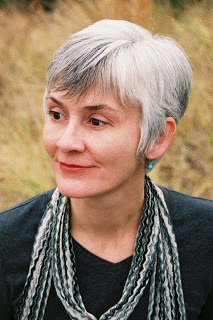 My mother, Suzanne Newton, is a writer, author of nine novels for young adults published by Westminster Press and Viking. Her first book, Purro and The Prattleberries (about a cat who discovers magic berries in his yard that enable him to speak) came out in 1971 when I was in the first grade. What I remember most about the publication of that book is how thrilled my school librarian, Mrs. Mullins, was to have the children of a real live author attending her school. For my remaining five years at A. B. Combs Elementary I could do no wrong in Mrs. Mullins' eyes–she let me check out as many books as I wanted, whenever I wanted, for as long as I wanted. It was awesome.
My mother, Suzanne Newton, is a writer, author of nine novels for young adults published by Westminster Press and Viking. Her first book, Purro and The Prattleberries (about a cat who discovers magic berries in his yard that enable him to speak) came out in 1971 when I was in the first grade. What I remember most about the publication of that book is how thrilled my school librarian, Mrs. Mullins, was to have the children of a real live author attending her school. For my remaining five years at A. B. Combs Elementary I could do no wrong in Mrs. Mullins' eyes–she let me check out as many books as I wanted, whenever I wanted, for as long as I wanted. It was awesome.On the eve of the release of my own first novel, Under The Mercy Trees, I decided to ask my mom what she remembered about getting her first book published. In many ways her experience was similar to mine, but in others the Information Age has made my publication experience radically different from hers.
My mom wrote her first book on a manual Hermes typewriter, using carbon paper to make herself a copy. Back then writers could actually send their manuscripts directly to publishers without having an agent (gasp!) and that's what my mom did. Over a two-year period she sent it out to one publisher at a time via snail mail (simultaneous submissions were a no-no) until finally she got back a thin envelope instead of the fat "we're-not-interested-here's-your-book-back" envelope. She told me that when the mailman delivered the thin envelope she went inside the house, locked the doors and took the phone off the hook so no one would interrupt her while she opened it. When she read the acceptance she was over the moon, just as I was when my agent called to tell me HarperCollins wanted to publish my novel.
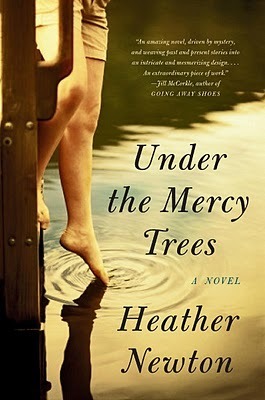 You can imagine what the editing process was like before the age of the personal computer. My mom had to make revisions on her Hermes. The galleys arrived as long unwieldy reams of paper. Once the book came out, her publisher clipped copies of reviews and mailed them to her–her only indication of how readers were receiving her book.
You can imagine what the editing process was like before the age of the personal computer. My mom had to make revisions on her Hermes. The galleys arrived as long unwieldy reams of paper. Once the book came out, her publisher clipped copies of reviews and mailed them to her–her only indication of how readers were receiving her book.In contrast, I had a computer to make the many revisions necessary to get my novel into publishable form. When my agent sent it out, most editors wanted an electronic file they could read on their e-readers. And during this past year, thanks to the Internet and Google Alerts, I have been able to read every review and reference to my book the minute any mention hits cyberspace.
One downside of the Internet is of course that it can rob you of writing time if you let it. It can also make a debut author horribly self-centered–the temptation to constantly see who is talking about you and your book is powerful. The benefits, however, far outweigh the negatives, and I don't just mean the opportunity to get the word out about your work via blogging, Facebook and the many other social media sites now available to authors.
For me, the most wonderful aspect of coming of age as a writer in the Information Age has been getting to know other authors on line this past year. These writers–mostly women and mostly debut novelists like me–are wonderful, interesting, talented people whose support and encouragement has really changed how I view my writing life. I no longer see myself as standing alone waist-deep in surf as waves buffet me and I struggle to remain on my feet. The community of writers I've found has allowed me to change that metaphor. I now feel like I'm nearing the end of a marathon with a lovely crowd of supporters cheering me on as I approach the finish line. In turn, I get the privilege of cheering for them and celebrating their successes. I'm so grateful.
Published on January 17, 2011 18:38
January 13, 2011
Introducing Jessica McCann: Debut Novelist
What's Missing from My Writingby Jessica McCann
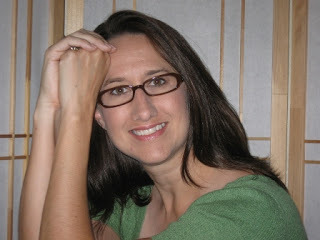 The first book I wrote was a murder mystery. The Missing Clock features murder, suspense, a smooth-talking private eye and a surprise plot-twist at the end, Scooby Doo-style. I was eight when I wrote it. The book was neatly bound with two staples. It also included a color illustration of the clock in question, a priceless heirloom encased in gold and sparkling gems.
The first book I wrote was a murder mystery. The Missing Clock features murder, suspense, a smooth-talking private eye and a surprise plot-twist at the end, Scooby Doo-style. I was eight when I wrote it. The book was neatly bound with two staples. It also included a color illustration of the clock in question, a priceless heirloom encased in gold and sparkling gems. My mom, a voracious reader, was my first fan and my first critic.
"I like it," she said. "But you should describe the clock instead of just drawing a picture."
It was my first lesson in the importance of revision, though I didn't know it at the time. My second lesson came years later from my high school English teacher, Mr. Churbuck, senior year. Revision, he said, was vital because it gives you a chance to add what's missing. And there's always something missing. The only way to earn an A in his class was to turn in a minimum of three drafts with every assignment -- one handwritten, complete with scratch marks, scribbles and arrows; one typed and littered with red-inked edits; and a typed final draft, which he would inevitably litter with red-inked edits of his own. By the end of the year, I was turning in four or five drafts, stacks of edits so thick they were barely harnessed by my second-hand stapler, and reveling in the fact that the only red mark on the final draft from Mr. C was an A+.
My mom's fierce love of books fueled my early desire to write; and Mr. Churbuck's fierce devotion to the art and craft of revision is what made me a writer.
Fortunately, those influences led to the creation of my second book, a historical novel. All Different Kinds of Free reveals one woman's courageous fight for freedom during the dark period of slavery in America. I was 38 when I finished writing it. The book went through countless drafts and revisions. It received a couple semi-finalist nods as a work-in-progress and a major literary award as a completed manuscript. I had landed an agent and was on submission to publishers when I gave my mom a printout to read.
"I like it," she said, handing it back to me roughly two weeks later. "I want to read a sequel."
### Jessica McCann, a professional freelance writer and novelist, lives with her family in Phoenix, Arizona. Her nonfiction work has been published in Business Week, The Writer and Phoenix magazines, among others. All Different Kinds of Free (Bell Bridge Books, April 2011) is her debut novel. She welcomes interaction with readers and writers at her website (www.jessicamccann.com) and on Twitter (@JMcCannWriter).
Published on January 13, 2011 13:38
January 9, 2011
That's What Friends -And Books - Are For by Malena Lott
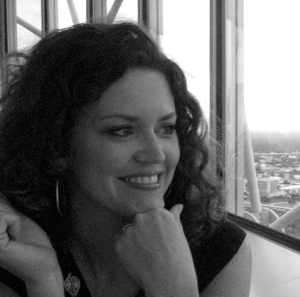 I'd hate to think of a world without friends. In an age when friendships can be made without meeting face-to-face thanks to the shrinking world made possible by the Internet, it's easier than times past to reach out and help someone or reach out and get help. At least that's what I'd like to think.
I'd hate to think of a world without friends. In an age when friendships can be made without meeting face-to-face thanks to the shrinking world made possible by the Internet, it's easier than times past to reach out and help someone or reach out and get help. At least that's what I'd like to think.In 2008, I joined Twitter, after my good friend, the funny Wichita photographer and detective, Ken Davis (@davis1862), told me how much fun it was. (Okay, not a direct quote, but something like that.) Back then, Twitter was a much smaller social club. Now it might be harder to get a response to a tweet because people are so busy and perhaps following so many people, but it has led to some great friendships for me and some great personal and professional growth. Facebook has grown even more intimate for me because I've reconnected with old friends that led to real-life coffees and martinis and I love getting to stay connected in my busy mommy world.
My favorite aspect of social networking is the "pass-it-on and pay-it-forward" qualities. Of course one can choose not to do these things, but RTs (retweets), sharing on FB and commenting on blogs and links helps spread the word about worthy causes, breaking news and niche interests. My niche interest, of course, is books and my blog Book End Babes has grown to include a dozen book bloggers (called bookettes), nearly a hundred guest authors, more than two hundred book give-aways and loads of connections between readers and authors and readers to great books.
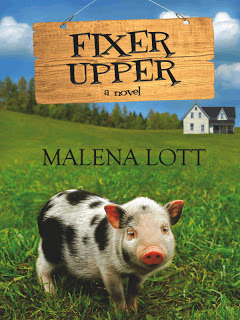 In my third novel, FIXER UPPER, the politician's wife, Macy Baxter, figures out the life she really wants after the one she has is no longer working. Her ambitious husband is more concerned with getting elected to the U.S. Senate than saving their marriage and she has never worked outside the home, held a tool or really stood up for herself. All that changes when she heads home to evaluate her own broken home and see what it will take to renovate her life. Find out more about Fixer Upper, new contests, excerpt and more at www.malenalott.com or on Amazon or smashwords.com.
In my third novel, FIXER UPPER, the politician's wife, Macy Baxter, figures out the life she really wants after the one she has is no longer working. Her ambitious husband is more concerned with getting elected to the U.S. Senate than saving their marriage and she has never worked outside the home, held a tool or really stood up for herself. All that changes when she heads home to evaluate her own broken home and see what it will take to renovate her life. Find out more about Fixer Upper, new contests, excerpt and more at www.malenalott.com or on Amazon or smashwords.com.
Published on January 09, 2011 07:54
January 5, 2011
Of Attics and Inheritance by Mara Buck
 My mother was an only child, a careful girl preceded by an only-child mother, equally docile and precise, so their toys and books were in remarkably pristine states when I came along. I was also an only child and there any similarity ended. I was not destructive, not wanton; I merely was interested in how things were made; their components. I did in fact write on pages of books --- I had taught myself to read at a rather precocious age since I heartily disliked the laboriously slow process of being read to --- and I created my own versions of new books from the old, a pastiche of childish chaos, and a truly unfortunate choice for any potential collectible resale. (Whatever was I thinking?) Left to my own devices in the attic, rummaging through boxes of books, old magazines, any printed matter I could find, I devoured, gobbled, gorged. By inheriting so-called children's books from another age, I inherited the stilted vocabulary of those authors as well. Unfortunately, my family's storage was heavily slanted in the direction of the "moral" tales of Pollyanna, Elsie Dinsmore and the Bobbsey Twins, all loathsome for myriad reasons. I was temporarily rescued by Alcott (whom I still found insipid despite Jo's gumption), was distressed by the cruelty in Black Beauty and Beautiful Joe, and thoroughly enjoyed Jack London and Frank Buck, and the nature-adventure life they portrayed, although I suspect if I revisited them today I would find the tales seeped in prejudice.
My mother was an only child, a careful girl preceded by an only-child mother, equally docile and precise, so their toys and books were in remarkably pristine states when I came along. I was also an only child and there any similarity ended. I was not destructive, not wanton; I merely was interested in how things were made; their components. I did in fact write on pages of books --- I had taught myself to read at a rather precocious age since I heartily disliked the laboriously slow process of being read to --- and I created my own versions of new books from the old, a pastiche of childish chaos, and a truly unfortunate choice for any potential collectible resale. (Whatever was I thinking?) Left to my own devices in the attic, rummaging through boxes of books, old magazines, any printed matter I could find, I devoured, gobbled, gorged. By inheriting so-called children's books from another age, I inherited the stilted vocabulary of those authors as well. Unfortunately, my family's storage was heavily slanted in the direction of the "moral" tales of Pollyanna, Elsie Dinsmore and the Bobbsey Twins, all loathsome for myriad reasons. I was temporarily rescued by Alcott (whom I still found insipid despite Jo's gumption), was distressed by the cruelty in Black Beauty and Beautiful Joe, and thoroughly enjoyed Jack London and Frank Buck, and the nature-adventure life they portrayed, although I suspect if I revisited them today I would find the tales seeped in prejudice. From kindly neighbors I was given hand-me-down Golden Books aplenty which seldom interested me since they were so short (a five minute read at best) and also decidedly lacked drama and character development, and moreover they were "pleasant" and I've never been particularly good at pleasant. Then I discovered 'Twain' as if some guilty secret under the covers: The Prince and the Pauper, Tom Sawyer and Huck. Here was some stuff! Boys got to do things beyond playing with dolls and keeping their clothes neat. What a fabulous idea! I still have a soft spot for ol' Sam and I did indeed once build a raft, which floats forever in my memory. A lovely metaphor, but in actuality, it sank. Perversely however, as is my penchant (that Edwardian vocabulary again), today I would award favorite childhood book status to the story of Miss Flora McFlimsey by Mariana, bought specifically for me (not inherited!) by my grandfather, who on the Christmas that he died, gave me the accompanying doll as well. A thoroughly charming story, Flora was a forgotten doll in the attic (I could identify) that was resurrected as a Christmas gift and freshly-beloved thereafter; lovely illustrations without becoming too saccharine. I believe there was a mouse involved ---isn't there always? Contrary to Tom and Huck, Flora delighted in tiny lacy handkerchiefs, buttoned shoes, and arrived complete with a trunk full of feminine foibles to tempt even the most stalwart of denim-wearers; a book and a doll that I did not destroy. Flora was mine alone, she was instant memory, and you do not destroy memory. Irrespective of their literary value, the characters in children's books burrow deep into our subconscious, and sometimes we unwittingly parrot their personae, even into adulthood. We are Peter and Wendy, Tom and Huck, Jo March, Dorothy, Christopher Robin, and even some of us (I say with a shudder) Pollyanna. I myself shall always tiptoe out of that attic alongside Flora on a magical Christmas Eve to a place where there is a happily-ever-after fresh start, despite wearing the costume of a discarded century. Flora, the doll, rests resplendent in tissue in my own attic, along with her book. The photographs of my grandfather are downstairs, with me.
Mara Buck writes and paints in the Maine woods. The manuscript for her novel Highway To Oblivion was named a Short-Listed Finalist for The Faulkner-Wisdom Prize. Recent prize-winning poems appear in Carpe Articulum and in Caper Literary Journal, with other work included in Vwa: Poems For Haiti and on Poets For Living Waters. She is the creator of the gallery-sized installation "A Year In Oblivion" a daily art chronicle of the life of a breast cancer patient, examples from which will soon be published in Drunken Boat. More of her writing may be seen at: http://www.redroom.com/member/MaraBuck Her videos may be seen at: http://www.youtube.com/user/marabuck And, an art/poetry/video for the World T
Published on January 05, 2011 10:02
January 3, 2011
Publisher's Weekly Review
Here it is folks. Thank you Publisher's Weekly. I held my breath the whole time I was reading it. Phew...now I can breathe again!
The Bird Sisters
Rebecca Rasmussen, Crown, $24 (304p) ISBN 978-0-307-71796-2
Rasmussen's debut novel begins like a typical coming-of-age story, but reveals itself to be a singular portrayal of familial sacrifice and loss. As elderly women, sisters Twiss and Milly live alone in the house where they grew up in Spring Green, Wis. They spend their days tending to injured birds and roaming their land, lost in memories. For Milly, there is the constant reminder of what could have been. Twiss spent her childhood happily trailing behind their golf-pro father, but Milly dreamed about a family and children that never happened. There was hope for a young Milly, until an accident strips their father of his golfing abilities and sets in motion a series of events that rips apart the already unstable family. Dad retreats to the barn, and mom bemoans her choice to marry for love, leaving behind her wealthy family; a cousin who was thought to be a friend becomes an unexpected rival; and the sisters are left with only each other. As young women, and as old ones, they learn that their relationship is rewarding, but not without consequence. Achingly authentic and almost completely character driven, the story of the sisters depicts the endlessly binding ties of family. (Apr.)
The Bird Sisters
Rebecca Rasmussen, Crown, $24 (304p) ISBN 978-0-307-71796-2
Rasmussen's debut novel begins like a typical coming-of-age story, but reveals itself to be a singular portrayal of familial sacrifice and loss. As elderly women, sisters Twiss and Milly live alone in the house where they grew up in Spring Green, Wis. They spend their days tending to injured birds and roaming their land, lost in memories. For Milly, there is the constant reminder of what could have been. Twiss spent her childhood happily trailing behind their golf-pro father, but Milly dreamed about a family and children that never happened. There was hope for a young Milly, until an accident strips their father of his golfing abilities and sets in motion a series of events that rips apart the already unstable family. Dad retreats to the barn, and mom bemoans her choice to marry for love, leaving behind her wealthy family; a cousin who was thought to be a friend becomes an unexpected rival; and the sisters are left with only each other. As young women, and as old ones, they learn that their relationship is rewarding, but not without consequence. Achingly authentic and almost completely character driven, the story of the sisters depicts the endlessly binding ties of family. (Apr.)
Published on January 03, 2011 07:20
December 30, 2010
Time Like the Present by Stephanie Anderson Witmer
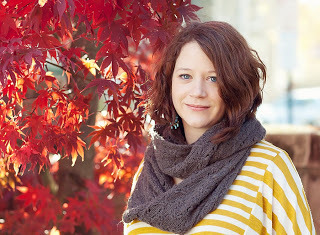 Tracy Heyman PhotographyMy house is quiet. Blessedly, gloriously quiet.
Tracy Heyman PhotographyMy house is quiet. Blessedly, gloriously quiet. It's four days after Christmas, and I am still in the throes of the four-week winter break (sometimes it's very good to be a professor). My husband has taken the week between Christmas and New Year's off, and this morning, he got up with our 19-month-old son and let me sleep the sleep of my former, childless self, unmarred by a to-do list or thoughts of what Benjamin will wear to daycare or the alarm clock of my son's early-morning calls for me from the confines of his crib.
When I finally do wake up at a luxurious 9:25 a.m., I find the house utterly still. I pad from the bedroom in my new red Christmas slippers, past my son's closed bedroom door, past the closed guest-room door, and descend the stairs. More quiet. Benjamin had likely just gone down for his morning nap, and my husband and our dog likely did the same in the guest bedroom, so as not to wake me.
In the kitchen, I piece together the clues of the morning I have missed: A container of cinnamon on the counter and an orange bowl on the kitchen table, empty except for the edges, rimed with sticky flecks of oatmeal. A discarded spoon next to it. A sippy cup with a splash of milk still in the bottom. I glance into the living room and see books and trucks strewn across the floor and couch. More toys lined up on the TV stand like a motley train.
There are things I know I should do while I have the chance during Benjamin's morning nap, like wash the breakfast dishes so that the oatmeal doesn't form a permanent crust in the bowl or vacuum the rug or put away more of the Christmas gifts. On many days, I would do those things, or I'd decide to grade some papers instead.
But I don't do any of those things today. Today I pour myself a cup of coffee in the biggest mug I can find, I make myself a bowl of oatmeal with vanilla, maple syrup, raisins and a liberal sprinkling of the cinnamon left on the counter. Mug in one hand and bowl in the other, I make a beeline to my office, and I write.
Sure, today is an example of a day in which I have absolutely nothing planned and can just sort of trot through it without a care. Lunch at our favorite little neighborhood cafe sounds nice … Perhaps I'll make a cake later … Or soup … I should go for a walk and shoot some photographs with my new camera … Or to the library …
Thoughts like these on days like these warrant the use of the ellipses. But most days aren't like today, and are punctuated far differently. They are crazy, harried, ultra-planned sorts of days. They are exclamation-point days, and not the good, surprise-party or you've-won-the-lottery kind of exclamation points. They are days that are often terse and demanding, like a drill sergeant.
When you're pregnant and then have a newborn, everyone always talks about sleep: How much sleep are you getting? How is the little one sleeping? Are you sleeping when the baby sleeps? Don't you miss sleep? Isn't sleep great? Most definitely, the lack of sleep was a rude awakening for both my husband and me, but it wasn't that we never slept again—we just didn't sleep all at one time as long as we wanted to.
But all that talk about sleep somewhat prepared me for the eventual time when I stopped getting it. It was the lack of time that really threw me. I've always been one to have lots of projects and ideas living in my head, and some of them would even make their way out of there into actual, physical incarnations of themselves. Now most don't, and probably won't.
I have found that after I had a child, I have become much more selfish with my time. First, because I teach three days a week, on the days when I am home with my son, I want to fill every moment with books and walks and adventures and the potential for memory-making, which is my own way of overcompensating for the days he spends with his grandparents or in daycare.
During the times I have to myself, like right now, I want to fill that space by doing what I want to do. I feared when I first had Benjamin that I'd never read a book or write a sentence for pleasure ever again, but I've actually written more regularly since he's been born than I have since graduate school. I began taking photographs. I started a blog. I don't cook as much as I'd like, but it's not uncommon for me to bake muffins or bread on a random Tuesday morning just because I feel like baking. Time has become the most valuable currency in my life.
Part of this is time, but part of it is my fear of losing myself entirely to motherhood and my job. I love both, but they are not the only parts of me. I find myself staying up later than is smart or healthy at night to write, simply because I'd rather forego a bit more sleep than a bit more of myself and my own creative needs. Both of my primary jobs—being a parent and being a professor—require a lot of my time and energy, and both require me to fulfill the needs of others. My son needs me (and his dad) to feed him, dress him, give him a bath, put him to bed, to love him and keep him safe. My students need me to teach them how to write and report accurately and ethically, to grade their work, to give them feedback, and prepare them for the great beyond that is their post-college working life.
Most importantly, both my son and my students need me to show up and be present. So does my husband. So does the rest of my family. So do my friends. And so do I need that of myself.
Stephanie Anderson Witmer is a freelance writer and an assistant professor in the Communication/Journalism Department at Shippensburg University in Pennsylvania. Her work has been published in national and regional magazines, including Better Homes & Gardens and Susquehanna Style. She has an M.F.A. in creative-nonfiction writing from Penn State University and blogs about parenting and cooking at www.smittenblog.com . She lives in Carlisle, Pennsylvania, with her husband, son and their dog.
Published on December 30, 2010 11:01
December 23, 2010
Tis the Season...Gifts Unseen! By Amanda Thrasher
Tis the Season…Gifts Unseen!
By Amanda M. Thrasher
 To say some things are meant to be is an understatement; this past weekend was an example of such for me. It started with a State 4A Championship game at the Dallas Cowboy's Stadium, in Arlington TX. We sat in front of a lovely young couple, making eye contact and small talk, a time or two. It was an exciting game and the Aledo Bearcats are State Champs again! The following day I had a signing that was very important to me for personal as well as professional reasons. First and foremost it was the official launch of, 'A Fairy Match in the Mushroom Patch', it was at my local Barnes & Noble, and as CRM, my Mentor hosted the event and I did not want to disappoint. I also had the privilege of meeting a very special lady, Beverly Hutton.
To say some things are meant to be is an understatement; this past weekend was an example of such for me. It started with a State 4A Championship game at the Dallas Cowboy's Stadium, in Arlington TX. We sat in front of a lovely young couple, making eye contact and small talk, a time or two. It was an exciting game and the Aledo Bearcats are State Champs again! The following day I had a signing that was very important to me for personal as well as professional reasons. First and foremost it was the official launch of, 'A Fairy Match in the Mushroom Patch', it was at my local Barnes & Noble, and as CRM, my Mentor hosted the event and I did not want to disappoint. I also had the privilege of meeting a very special lady, Beverly Hutton.
During a book signing for, 'Mischief in the Mushroom Patch', a lady I had never met purchased two copies . I couldn't recognize her face, or point her out in a crowd. But, I do know we must have spoken, because I handed her a business card and asked her specifically to let me know what she thought and weeks later she did just that! Her contact came in the form of an email. She introduced herself and described how she had read and enjoyed my book. She went on to say that her daughter would have loved it too. At the end of her beautiful email she made a request; a suggestion if you will. She said, "Amanda if I may ask, could you possibly create a character with a disability? My daughter was bound to a chair and I wasn't supposed to have her for very long. I was blessed with her for longer than I thought, but she always asked me, 'mommy where are the fairy tales for me?' She would have loved this and so would the children from the camps she used to attend."
I thought about that email before I replied, because it had touched me so. I emailed her back and said, "If you give me just a minute to think, I may be able to do that." I had two major concerns. First and foremost, I had to be respectful of her request; secondly my mushroom patch and its characters were already in place. I did however manage to create the most beautiful little fairy you can imagine; her name is Pearle. Though Pearle is bound to a wheel chair, I refer to it throughout as her chariot. Although, the reader knows she has no use of her legs, there's really no need to discuss this, since it's always understood. All of the fairies know and accept her as is; but more importantly she is comfortable and loves herself too. It slows her down not one little bit and she is loved by all of the others in the patch. Her gift is to fly effortlessly when she is free to do so; it is the perfect trade off. She never complains and is happy all the time, because she knows no other way to be. The other fairies dive in her lap and she gives them rides to the bathing room and often plays her favorite game 'make a 'fairling green', spinning as fast as she can in her chariot while the others try to stay aboard and try desperately not to turn green!
It was the oddest thing; when Beverly walked into Barnes & Noble I recognized her immediately; though I didn't know her. We embraced and shared a moment only she and I understood. I was stunned when she pulled out the most beautiful photos I had ever seen; they were of course of her daughter, Jeni and she gave them to me! This book is dedicated to Jeni and Beverly bought several copies. As I signed the books, I asked her, "What will you do with all of these books?" Beverly said, "I shall take them to the hospitals that treated Jeni and children like her." I was so touched that I asked her, "Do you have contacts there still, and if so, may I go with you?" She said, "Would you do that with me?" I assured her not only would I do that, but that would be 'our thing', in honor of Jeni from now on. We will visit those hospitals and read and talk about writing; it will bring us all so much joy, will it not!
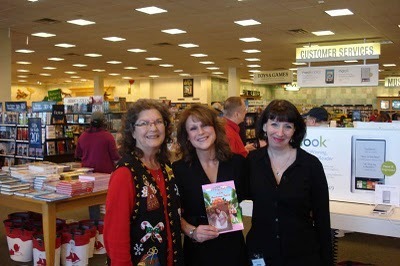 Which brings me to another beautiful moment that was meant to be; that beautiful young couple at the game was from Aledo, the stadium was in Arlington and the book signing was in Fort Worth. During my signing that couple walked into Barnes & Noble to Christmas shop; we recognized each other immediately. They were as stunned as I was. There had been 27,330 people at the Dallas Cowboy's Stadium the previous evening and yet, there I was in front of them; the author. They had no one to purchase my book for, but they did! I suggested they donate it to a children's home or hospital; they named one immediately. "I happen to know for a fact I will be visiting that one," I said. "When you donate this book, please tell them the author will come and read it. You can tell them that YOU know that for a fact!"
Which brings me to another beautiful moment that was meant to be; that beautiful young couple at the game was from Aledo, the stadium was in Arlington and the book signing was in Fort Worth. During my signing that couple walked into Barnes & Noble to Christmas shop; we recognized each other immediately. They were as stunned as I was. There had been 27,330 people at the Dallas Cowboy's Stadium the previous evening and yet, there I was in front of them; the author. They had no one to purchase my book for, but they did! I suggested they donate it to a children's home or hospital; they named one immediately. "I happen to know for a fact I will be visiting that one," I said. "When you donate this book, please tell them the author will come and read it. You can tell them that YOU know that for a fact!"
We are surrounded by beautiful gifts; though often we cannot see them. I choose to take pleasure in the simple things; they bring me the most joy. I can't hold them in my hands, look at them or touch them; but I can feel them deep within and that's good enough for me!
***********
My name is Amanda M. Thrasher; writer by heart first and author second to that. I was born in England but moved to Fort Worth, TX, when I was fourteen years old and reside there still. I have been writing stories and poems since I was nine years old. After leaving the corporate world to focus on my family, writing full time became a priority. The Mischief series is very special to me; a story written for a woman I loved very much. It was my mother who said, "Amanda you write all of the time and yet send nothing in; send your work in, if only for me." My mother loved fairies and collected them all over her house and yard and was incredibly ill when she made the request. She never saw "Mischief in the Mushroom Patch" or "A Fairy Match in the Mushroom Patch" in print. Mischief in the Mushroom Patch was written for her.
The Mischief series is written with the intent to bring back fairy tales in a delightful new way. I hope that I have managed to do this. I would like my little readers to escape momentarily into an unbelievable, believable, place, one filled with adventure. Though the books have gentle life lessons entwined throughout, the children learn them without realizing so. It is written purposely with polite characters, that judge each other not as demonstrated through their love of beautiful little Pearle. The characters are nice and kind because that's the way it is supposed to be. "There's a lot to be said for kind." I personally believe our children are losing these types of classic fairy tales. No scary characters in the mushroom patch or good vs. evil, just whimsical and lovely, that too, specifically written that way.
I love the whole writing and creating process because I simply love words. To me writing is like beautiful art; unique to the writer that crafts them. I love the fairy world I have created and hope my readers do too. My favorite words…"Why not!"

By Amanda M. Thrasher
 To say some things are meant to be is an understatement; this past weekend was an example of such for me. It started with a State 4A Championship game at the Dallas Cowboy's Stadium, in Arlington TX. We sat in front of a lovely young couple, making eye contact and small talk, a time or two. It was an exciting game and the Aledo Bearcats are State Champs again! The following day I had a signing that was very important to me for personal as well as professional reasons. First and foremost it was the official launch of, 'A Fairy Match in the Mushroom Patch', it was at my local Barnes & Noble, and as CRM, my Mentor hosted the event and I did not want to disappoint. I also had the privilege of meeting a very special lady, Beverly Hutton.
To say some things are meant to be is an understatement; this past weekend was an example of such for me. It started with a State 4A Championship game at the Dallas Cowboy's Stadium, in Arlington TX. We sat in front of a lovely young couple, making eye contact and small talk, a time or two. It was an exciting game and the Aledo Bearcats are State Champs again! The following day I had a signing that was very important to me for personal as well as professional reasons. First and foremost it was the official launch of, 'A Fairy Match in the Mushroom Patch', it was at my local Barnes & Noble, and as CRM, my Mentor hosted the event and I did not want to disappoint. I also had the privilege of meeting a very special lady, Beverly Hutton. During a book signing for, 'Mischief in the Mushroom Patch', a lady I had never met purchased two copies . I couldn't recognize her face, or point her out in a crowd. But, I do know we must have spoken, because I handed her a business card and asked her specifically to let me know what she thought and weeks later she did just that! Her contact came in the form of an email. She introduced herself and described how she had read and enjoyed my book. She went on to say that her daughter would have loved it too. At the end of her beautiful email she made a request; a suggestion if you will. She said, "Amanda if I may ask, could you possibly create a character with a disability? My daughter was bound to a chair and I wasn't supposed to have her for very long. I was blessed with her for longer than I thought, but she always asked me, 'mommy where are the fairy tales for me?' She would have loved this and so would the children from the camps she used to attend."
I thought about that email before I replied, because it had touched me so. I emailed her back and said, "If you give me just a minute to think, I may be able to do that." I had two major concerns. First and foremost, I had to be respectful of her request; secondly my mushroom patch and its characters were already in place. I did however manage to create the most beautiful little fairy you can imagine; her name is Pearle. Though Pearle is bound to a wheel chair, I refer to it throughout as her chariot. Although, the reader knows she has no use of her legs, there's really no need to discuss this, since it's always understood. All of the fairies know and accept her as is; but more importantly she is comfortable and loves herself too. It slows her down not one little bit and she is loved by all of the others in the patch. Her gift is to fly effortlessly when she is free to do so; it is the perfect trade off. She never complains and is happy all the time, because she knows no other way to be. The other fairies dive in her lap and she gives them rides to the bathing room and often plays her favorite game 'make a 'fairling green', spinning as fast as she can in her chariot while the others try to stay aboard and try desperately not to turn green!
It was the oddest thing; when Beverly walked into Barnes & Noble I recognized her immediately; though I didn't know her. We embraced and shared a moment only she and I understood. I was stunned when she pulled out the most beautiful photos I had ever seen; they were of course of her daughter, Jeni and she gave them to me! This book is dedicated to Jeni and Beverly bought several copies. As I signed the books, I asked her, "What will you do with all of these books?" Beverly said, "I shall take them to the hospitals that treated Jeni and children like her." I was so touched that I asked her, "Do you have contacts there still, and if so, may I go with you?" She said, "Would you do that with me?" I assured her not only would I do that, but that would be 'our thing', in honor of Jeni from now on. We will visit those hospitals and read and talk about writing; it will bring us all so much joy, will it not!
 Which brings me to another beautiful moment that was meant to be; that beautiful young couple at the game was from Aledo, the stadium was in Arlington and the book signing was in Fort Worth. During my signing that couple walked into Barnes & Noble to Christmas shop; we recognized each other immediately. They were as stunned as I was. There had been 27,330 people at the Dallas Cowboy's Stadium the previous evening and yet, there I was in front of them; the author. They had no one to purchase my book for, but they did! I suggested they donate it to a children's home or hospital; they named one immediately. "I happen to know for a fact I will be visiting that one," I said. "When you donate this book, please tell them the author will come and read it. You can tell them that YOU know that for a fact!"
Which brings me to another beautiful moment that was meant to be; that beautiful young couple at the game was from Aledo, the stadium was in Arlington and the book signing was in Fort Worth. During my signing that couple walked into Barnes & Noble to Christmas shop; we recognized each other immediately. They were as stunned as I was. There had been 27,330 people at the Dallas Cowboy's Stadium the previous evening and yet, there I was in front of them; the author. They had no one to purchase my book for, but they did! I suggested they donate it to a children's home or hospital; they named one immediately. "I happen to know for a fact I will be visiting that one," I said. "When you donate this book, please tell them the author will come and read it. You can tell them that YOU know that for a fact!" We are surrounded by beautiful gifts; though often we cannot see them. I choose to take pleasure in the simple things; they bring me the most joy. I can't hold them in my hands, look at them or touch them; but I can feel them deep within and that's good enough for me!
***********
My name is Amanda M. Thrasher; writer by heart first and author second to that. I was born in England but moved to Fort Worth, TX, when I was fourteen years old and reside there still. I have been writing stories and poems since I was nine years old. After leaving the corporate world to focus on my family, writing full time became a priority. The Mischief series is very special to me; a story written for a woman I loved very much. It was my mother who said, "Amanda you write all of the time and yet send nothing in; send your work in, if only for me." My mother loved fairies and collected them all over her house and yard and was incredibly ill when she made the request. She never saw "Mischief in the Mushroom Patch" or "A Fairy Match in the Mushroom Patch" in print. Mischief in the Mushroom Patch was written for her.
The Mischief series is written with the intent to bring back fairy tales in a delightful new way. I hope that I have managed to do this. I would like my little readers to escape momentarily into an unbelievable, believable, place, one filled with adventure. Though the books have gentle life lessons entwined throughout, the children learn them without realizing so. It is written purposely with polite characters, that judge each other not as demonstrated through their love of beautiful little Pearle. The characters are nice and kind because that's the way it is supposed to be. "There's a lot to be said for kind." I personally believe our children are losing these types of classic fairy tales. No scary characters in the mushroom patch or good vs. evil, just whimsical and lovely, that too, specifically written that way.
I love the whole writing and creating process because I simply love words. To me writing is like beautiful art; unique to the writer that crafts them. I love the fairy world I have created and hope my readers do too. My favorite words…"Why not!"
Published on December 23, 2010 07:00
December 20, 2010
Huffington Post
Good morning everyone: I wanted to share with you some wonderful news. Today, I am on the Huffington Post. If you have a chance, check it out. And thank you, always, for your support. It helps me so much!
http://www.huffingtonpost.com/anis-shivani/virtual-book-tour_b_796297.html
With Love from Florida, Rebecca
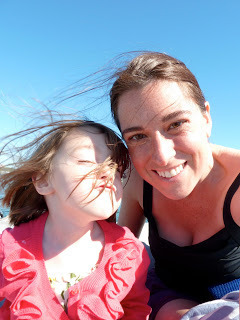

http://www.huffingtonpost.com/anis-shivani/virtual-book-tour_b_796297.html
With Love from Florida, Rebecca

Published on December 20, 2010 06:04
December 15, 2010
A Guest Post by Author Kim Wright
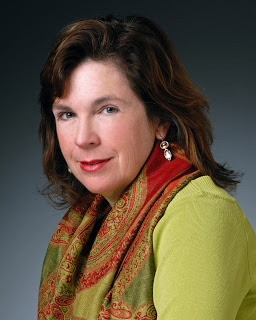 Kim Wright has been a freelance writer for 25 years with a special emphasis on food, wine and travel. She lives in Charlotte NC and Love in Mid Air is her first novel. You can find her at www.loveinmidair.com and http://www.amazon.com/Love-Mid-Air-Kim-Wright/dp/0446540447/ref=sr_1_1?ie=UTF8&s=books&qid=1268018577&sr=1-1
Kim Wright has been a freelance writer for 25 years with a special emphasis on food, wine and travel. She lives in Charlotte NC and Love in Mid Air is her first novel. You can find her at www.loveinmidair.com and http://www.amazon.com/Love-Mid-Air-Kim-Wright/dp/0446540447/ref=sr_1_1?ie=UTF8&s=books&qid=1268018577&sr=1-1I teach writing workshops and one of the questions I'm frequently asked is at what point you should solicit feedback from other writers. My thinking on this has changed over time - the longer I write, the more eager I've become to get feedback earlier in the process, at least from amateur readers.
By "amateur" I mean people who aren't agents, editors, or teachers in an MFA program. It's up to you who you ask, but it's worth taking time to consider who might serve best in this crucial role of first readers.
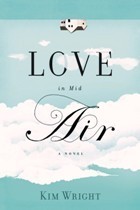 I only show work in progress to other writers. A lot of my friends are writers so it's an easy call to also make them my first readers. For other people, avid readers work just as well. And some brave souls use their spouses, lovers, mothers or siblings as first readers. It's really a matter of personal preference. I like using writers because once they tell you what they think isn't working – the beginning is slow, your narrator is coming off like a shrew, you have too many scenes of people sitting in restaurants talking – they often have suggestions for how you might correct this problem as well. I appreciate this sort of feedback, but some writers find it oppressive. They prefer getting raw reactions from people who represent their future readers, i.e., people who love books but aren't writers, and who thus aren't apt to offer so damn many suggestions.
I only show work in progress to other writers. A lot of my friends are writers so it's an easy call to also make them my first readers. For other people, avid readers work just as well. And some brave souls use their spouses, lovers, mothers or siblings as first readers. It's really a matter of personal preference. I like using writers because once they tell you what they think isn't working – the beginning is slow, your narrator is coming off like a shrew, you have too many scenes of people sitting in restaurants talking – they often have suggestions for how you might correct this problem as well. I appreciate this sort of feedback, but some writers find it oppressive. They prefer getting raw reactions from people who represent their future readers, i.e., people who love books but aren't writers, and who thus aren't apt to offer so damn many suggestions.But there's one group you definitely don't want as first readers: talented, even brilliant writers who can't seem to get working on anything of their own. They're blocked…they're torn between two projects….they're still recovering from the savage rejection they suffered in 1994….they're waiting until they get their office feng shuied or their eldest son gets out of juvie…..The list of reasons that writers don't write is endless, but the point is you can't afford to deal with these people right now. Yeah, I know they're smart and I know they have all kinds of time on their hands. They may even volunteer to read it. If they do, just mumble something vague about not being quite ready to show your work yet.
Because blocked writers tend to be bad readers. They may be unconsciously jealous that you're actually doing what they're just talking about doing and be overly critical of your work. They, again unconsciously, may try to talk you into writing the book they can't write and will thus come back with extraordinarily unhelpful advice such as "This story would work much better if it was set in Paris on the brink of World War I." Or they may be blocked because they're perfectionists and carry that same perfectionism to their read of your work, giving you a line edit when what you really need is a big-picture analysis of the book.
How many first readers do you need? I'd say the perfect amount is between three and five. For starters, different people are going to catch different things, so you want some variety in your first reader circle. If you only have one or two people read it, any comments they make will have too much impact on your thinking. Let's say you have a rather graphic sex scene. If you only had one first reader and she objected to the scene, there's a chance that she's coming out of a personal place. Maybe she simply doesn't like direct sexuality in books or something about the scene was triggering for her, so cutting that scene based on a single person's read could well be a mistake.
But if four people read it and they all thought the scene was too much, you need to consider cutting it. Note that I said "consider." You don't have to cut it. First readers are just that, readers, not ultimate judges of your work. But if you show a manuscript to a variety of people and they all stumble over the same scene or dislike the same character, you owe it to yourself to take their comments seriously. Nothing is more annoying than the writer who solicits feedback and then ignores it. Most often these people were pretending to want critiques when they really just wanted praise, and serious readers soon tire of working with divas, no matter how talented they might be.
At the other end of the spectrum, you don't want to have too many readers. If you show work to ten people you're likely to end up with such a mishmash of opinions that you'll be confused. Ellie loved the ending. Josh felt it faded out. Caroline felt the dialogue just needed some tweaking, and Mark insists that the real ending of the story is twenty pages earlier and the last chapter is superfluous. Too much feedback can be paralyzing, worse than none at all. If you try to incorporate everyone's suggestions, your book may ended up with that "edited by committee" feeling sometimes seen in books that were spawned in MFA programs and have been subsequently workshopped to death. These books don't have any mistakes but they also don't have any life. The author listened to everyone, taking out any possibly offensive and therefore any unique parts of the manuscript, and the result was a story with all energy and individuality of a dial tone.
Published on December 15, 2010 06:29



